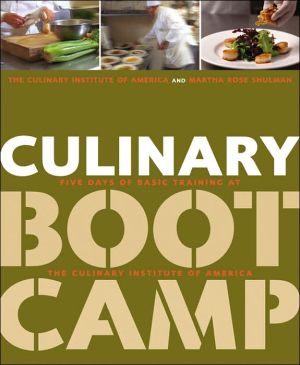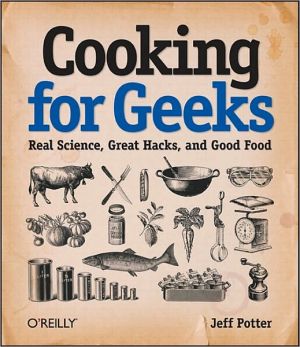Culinary Boot Camp: Five Days of Basic Training at the Culinary Institute of America
Experience the intensity of basic training with the "most influential training school for professional cooks" (Time magazine)\ DAY 1: "Our 'drill sergeant' comes into the room and writes his name on the board. He wears the CIA staff jacket, a green name badge, and the chef's kerchief around his neck, which he later shows us how to tie. 'YOU ARE MINE!' he says with a sly smile on his face, and we know that he's going to give us the guidance we need. He'll be strict, but kind."\ DAY 2: "Until I...
Search in google:
Discover the secrets of The Culinary Institute of America?s popular week-long "Boot Camp" course — five days of dynamic, hands-on instruction in cooking basics that help teach the non-professional cook to think like a chef — with Julia Child Award-winning cookbook author Martha Rose Shulman. Combining Shulman?s entertaining and compelling narrative with a wealth of invaluable culinary information, you'll take a "step up" in the kitchen with this vicarious adventure through basic training at one of the country?s finest professional cooking schools. DAY 1: "Our 'drill sergeant' comes into the room and writes his name on the board. He wears the CIA staff jacket, a green name badge, and the chef's kerchief around his neck, which he later shows us how to tie. 'YOU ARE MINE!' he says with a sly smile on his face, and we know that he's going to give us the guidance we need. He'll be strict, but kind." DAY 2: "Until I went to Boot Camp, I was never very comfortable around (or succeessful with) lots of hot oil in a pan. That was all about to change." DAY 3: "One of the most important terms for dry heat cooking is 'carryover cooking.' Carryover cooking refers to the fact that heat penetrates meat from the outside to the inside, and when you remove it from the oven, the meat will continue to cook. That's why it must rest, during which time the carryover cooking continues, the temperature equalizes, and the juices relax and flow through the meat." DAY 4: "Our dessert was a Warm Dark Chocolate Pudding Cake, and it was served with a glass of Quady Elysium from Madera County, California. They named their black muscat dessert wine Elysium because, in theirwords, 'Drinking this, you can almost feel you have fallen into a rose garden and been transported to heaven.' And I must say I did. I transported myself to bed instead, thinking what an appropriate meal this had been after our first wine lecture, and about the wines I would serve with my own next dinner party." DAY 5: "We sampled each team's handiwork, and as we were polishing off this large meal, our chef stood up to congratulate us and hand out our 'certificates of accomplishment.'" Publishers Weekly For anyone who's fantasized about attending culinary school-or any curious cook who wants to understand more about the fundamentals of fine cooking-this book offers a peek into an ber-condensed, intensive version of Culinary Institute of America training for nonprofessionals. In an era when most bestselling cookbooks eschew traditional techniques in favor of time-saving shortcuts, the book is an anomaly. Shulman (Entertaining Light), an IACP Award-winning cookbook author, takes readers along with her as she attends the CIA's five-day "boot camp" and explains the lessons she learned, from preparing stocks and sauces, to using knives and understanding proper saut protocol, along with (occasionally overbearing) personal commentary about the experience. Some organizational elements don't make sense-the section on stocks, for example, precedes the recipes for stocks by more than 100 pages-and some recipes are unnecessary (the author criticizes the CIA's cornbread recipe and inserts her own instead). But the text is packed with good insider info, and most of the 75 recipes, such as Spinach Spaetzle with Sapsago Cheese, and Morel and Wild Mushroom Rago t, are time-honored yet contemporary, rigorous yet approachable. 100 full-color photos. (May 6) Copyright 2006 Reed Business Information.
Preface. Introduction. Day 1: INTO THE KITCHEN: STOCKS AND SAUTÉS. Into the Kitchen. Our Space. Stocks. Sauces. Sautés. Knife Skills and Mise en Place. Thickeners. Dinner at St. Andrew’s Café. Day 2: SOUP PRODUCTION AND FRYING TECHNIQUES. The Final. Soups. Cooking with Fats. Stir Frying. Pan-Frying. Deep Frying. The Underbelly of the CIA. Dinner at the Escoffier Restaurant. Day 3: DRY HEAT COOKING METHODS. Roasting. Broiling and Grilling. Introduction to Wines. Dinner at American Bounty Restaurant. Day 4: MOIST HEAT COOKING METHODS. Combination Methods. Steaming. Poaching. Simmering and Boiling. Developing a Menu. Turning Skills into Recipes, from Basic to “Stepped Up”. Dinner at Ristorante Caterina de’ Medici. Day 5: OUR FINAL EXAM. Into the Kitchen, for the Last Time. Production. Show Time. Graduation. Postscript. Mise en Place and Knife Skills. Mise en Place. Our Knife Kits. Basic Cuts. How to Cut. Additional Boot Camp Recipes. Stocks and Sauces. Appetizers and Soups. Entrées. Side Dishes. Reflections on Culinary French. Index. Benefactors Acknowledgments.
\ From Barnes & NobleThis surprisingly instructive book doesn't just take readers inside the Culinary Institute of America's popular week-long "Boot Camp" course; it teaches you essential kitchen skills that all serious cooks need to enhance their repertoire. Penned by Julia Child Award-winning cookbook author Martha Rose Shulman, Culinary Boot Camp covers everything from basic terms and use of kitchen tools to cooking techniques and wine and food pairings.\ \ \ \ \ Publishers WeeklyFor anyone who's fantasized about attending culinary school-or any curious cook who wants to understand more about the fundamentals of fine cooking-this book offers a peek into an ber-condensed, intensive version of Culinary Institute of America training for nonprofessionals. In an era when most bestselling cookbooks eschew traditional techniques in favor of time-saving shortcuts, the book is an anomaly. Shulman (Entertaining Light), an IACP Award-winning cookbook author, takes readers along with her as she attends the CIA's five-day "boot camp" and explains the lessons she learned, from preparing stocks and sauces, to using knives and understanding proper saut protocol, along with (occasionally overbearing) personal commentary about the experience. Some organizational elements don't make sense-the section on stocks, for example, precedes the recipes for stocks by more than 100 pages-and some recipes are unnecessary (the author criticizes the CIA's cornbread recipe and inserts her own instead). But the text is packed with good insider info, and most of the 75 recipes, such as Spinach Spaetzle with Sapsago Cheese, and Morel and Wild Mushroom Rago t, are time-honored yet contemporary, rigorous yet approachable. 100 full-color photos. (May 6) Copyright 2006 Reed Business Information.\ \ \ Library JournalThe Culinary Institute of America (CIA) now offers a variety of "boot camp" workshops at its main campus in Hyde Park, NY, and Shulman attended two week-long sessions of the basic boot camp: five days of "demo" and hands-on cooking lessons, with dinner each night at one of the CIA's restaurants. Shulman is a well-known food writer and the author of numerous cookbooks, but her expertise is more in vegetarian and "light" cooking, so she found that she learned quite a bit despite her experience in the field. The lessons each day were built around specific techniques, starting with stocks and saut s and moving on through various cooking methods, and Shulman's account of her experience results in a minitutorial with recipes, charts, and step-by-step photographs. Her readable book should be of interest to anyone considering cooking school, as well as fans of the CIA's cookbooks or television series; Michael Ruhlman's Making of a Chef, which recounts the 18 months he spent "under cover" as a journalist in the professional program, offers a more in-depth look at the school. Copyright 2006 Reed Business Information.\ \








